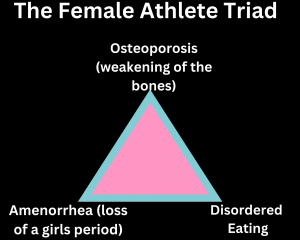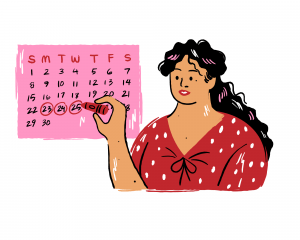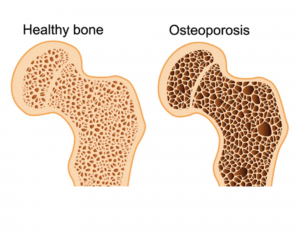The Female Athlete Triad is a combination of three conditions that we sometimes see in female athletes at our clinics in Blanchardstown, Castleknock and Tallaght. These are:
- Disordered Eating
- Amenorrhea (loss of a girls period)
- Osteoporosis (weakening of the bones)

Low energy availability is typically the source of the other two triad components due to its 1). Negative affects on reproductive function and bone health and 2). Detrimental effects that reproductive dysfunction caused by low energy availability has on bone health.
Though it is named the female athlete triad, it does not limit to just Athletes. Young girls from ages 11-14 where menstruation begins may also experience these conditions and it is important to be aware of this.

- Disordered Eating
Disordered eating is the abnormal eating patterns ranging from mild or occasional abnormal eating behaviours (restriction of high fat foods, fasting) to the more extreme conditions of Anorexia (voluntary starvation) and Bulimia (binging and purging). Disordered eating causes the athlete or young girl to become nutritionally deficient if their energy intake is less than the energy they have used through intense training.
Lack of nutritional availability can have an affect on hormones responsible for the normal function of the menstrual cycle, difficulty recovering from an injury and the inability to maintain bone mass.
.

- Amenorrhea
Amenorrhea is the absence of a menstrual cycle for more than 90days. As mentioned previously, younger girls generally begin menstruation between the ages of 11 – 14. As this is the beginning, it is not uncommon for young girls to experience inconsistent or irregular periods in the first year which can makes Amenorrhea difficult to detect.
Amenorrhea is divided into primary and secondary subsets:
- Primary: absence of the first cycle after the age of 15 years
- Secondary: absence of 3 consecutive cycles after previously having a menstrual cycle
- Osteoporosis
Unlike the other conditions of the triad, poor bone health develops silently as often there are no symptoms. A loss of the hormone Estrogen due to the absence of menstruation, combined with poor nutrition can lead to Osteoporosis. For most females, 90% of peak bone mineral density is reached by the age of 18 and the greatest increase is between the ages of 11 and 14 years, which is where menstruation begins.
Athletes and young girls who participate in sports with high impact (running, hurdling, football) and odd impact (step aerobics, tennis) have been shown to be the most favourable sports for bone health.
How is it Diagnosed?
There is no diagnosis for the Female Athlete Triad but your GP may take blood tests, recommend bone density testing (DEXA Scan) or menstrual assessments to check your overall health. Questionnaires such as the FAST (Female Athlete Screening Tool) and the LEAF (Low Energy Availability in Females) are a great way to see if an athlete or young girl falls under the umbrella of the Female Athlete Triad.
Some signs and symptoms that are present in the Female Athlete Triad are:
- A female with period problems / lack of period
- Multiple stress fractures / broken bones
- Weight loss / restricted eating
- Excessive training
The best way for athletes and girls to avoid falling under this term is to:
- Keep track of regular periods
- Eat well and don’t skip meals
- Take breaks from training to avoid injury and burnout
How can Physio Help ?
Physiotherapy can help by identifying the signs and symptoms and help with any injuries associated with the female athlete triad. Our Physios can also guide them through an appropriate strength and conditioning program to help their bones and muscles become stronger. Education of the Female Athlete Triad is vital to any athlete and young girl as it is the best way to avoid any detrimental affects in the future. Our physios can help explain the causes and help with further treatment if necessary.
To get in touch email us on [email protected] or phone us on (01) 9069566 . Follow us on Instagram for physiotherapy and clinic Updates.

